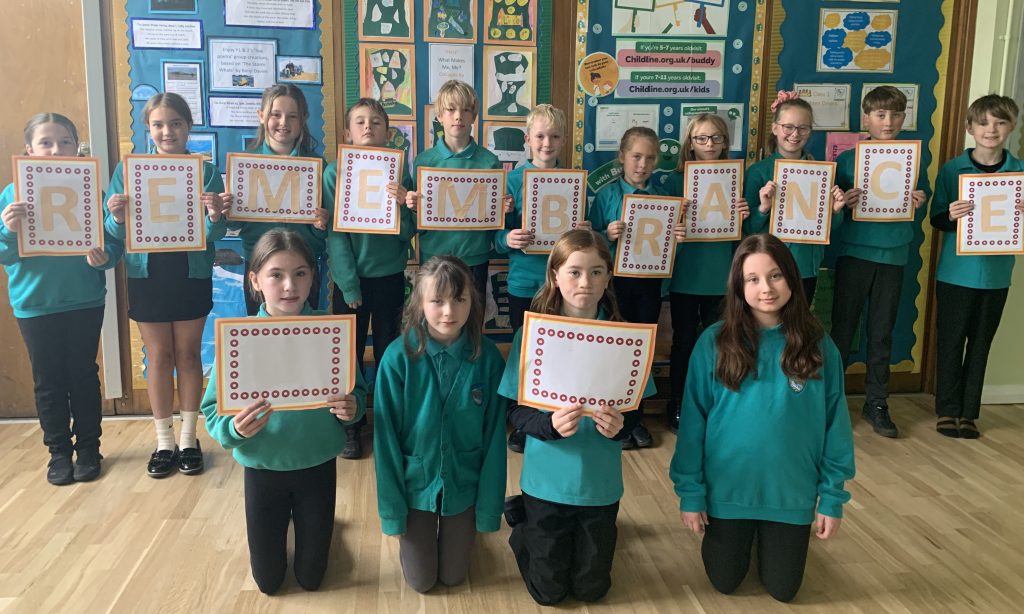Bolton Service of Remembrance
The 2024 Service took place on the 11th of November. The service was led by the Reverend James Bell and those attending included village residents and children attending Bolton Primary School. The pupils in Years 5 & 6 gave an excellent presentation of the word REMEMBRANCE, with each letter representing some aspect of Warfare. The children gave a short explanation of the aspect. Picture and words below
1: Rosie Good morning and thank you for joining us today at Bolton’s Memorial Hall.
In school we have been remembering all the people that gave their lives. We have used the 11 letters that make up the word
R E M E M B R A N C E
and linked each initial to information that we know about World War 1. Try hard as you listen to each word, to think about those that showed bravery and made enormous sacrifices so that we could live free lives today. Remember too that as we speak people like us are experiencing the hardships and horrors of war today. Sadly, war is not confined to the past.

2: Evie The first letter R
Regiments – regiments were, and still are, a military group or unit that is made up of a large group of soldiers. They are then organised into companies, battalions and squadrons that were led by a colonel. In WW1 the British army would allow groups of friends, brothers and neighbours and workmates to volunteer together and let them serve in the same regiments. It was to encourage young men to join up and was popular. However, the fact that the regiments consisted of large numbers of men from the same community meant that the impact of their heavy losses were devastating for their families and communities back home. In some towns almost an entire generation of men was lost at once.
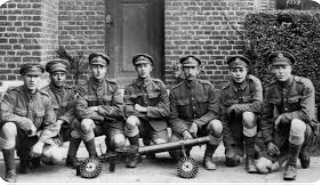
3: Elia The first letter E
Empire – at the time of World War 1, the British Empire spanned 35 million square kilometres. The colonies that were British included India, Australia, Canada and South Africa. Britain’s colonies sent over two and a half a million men to fight for Britain. India sent the most soldiers. In fact, soldiers fought for Britain from five different continents: Europe, America, Australasia, Asia and Africa. Sadly, soldiers from the colonies were not allowed to train as officers and English nurses were not allowed to treat Indian soldiers. Although they were allowed to follow their religions and eat according to their beliefs many of them experienced racism. They were mainly used for manual labour such as digging trenches, moving supplies and clearing battlefields. Britain saw how much these colonies helped and decided some would be given more freedom and this was the first step towards some countries gaining independence.
4: Poppy The first letter M
Munitions – munitions are military weapons, and the armed forces needed vast amounts of them. Huge quantities of steel, copper, explosives and other materials were needed to make munitions. In 1915 there was a shortage of munitions. Factories made everything from shells to tanks, gas masks and boxes. On the home front, workers were recruited for the munition factories and a large proportion of these were women who were nicknamed the munitionettes or canary girls. Some men were against women working in the factories and they thought that women couldn’t do the work, but the urgent need outweighed the protest, so women were employed. The factories were noisy, chaotic places and it was a highly dangerous job because of the materials used to make explosives. Known as TNT poisoning, often munition workers turned yellow by the chemicals they handled, and this explained the name Canary girls. Some women died from working with TNT. Sometimes there were accidents and explosions in the factories and health and safety was generally poor. Equal pay to women was never fully realised and female staff were often underpaid. By the end of the war up to one million women had become munitionettes and their contribution to the war effort undeniably helped with some women achieving the vote in 1918.
5: Charlie The second letter E
Espionage – espionage in war means the process of obtaining military, political, commercial, or other secret information by means of spies, secret agents or illegal monitoring devices. German archives reveal that at least 120 spies were sent to Britain during the First World War. MI5 caught 65 of them. During World War 1, pigeons acted as spies as they were outfitted with tiny cameras and released over enemy territory. As the birds flew, the cameras clicked away and gave important information to help plan attacks. Advances in communications technology meant that both sides used ‘intelligence operators’ to intercept wire transmissions, break sophisticated codes and expose the senders’ plans and intentions. In 1917 the British managed to break a code and discovered a German plot targeting the United States and this drew America into the conflict which fundamentally changed the tide of the war.
6: Tom The second letter M
Medicine – injured and sick soldiers needed to be treated quickly so that they could go back to fighting as soon as possible. The weapons of shells, machine guns and poisonous gas were used on mass for the first time and resulted in a scale of injuries that had never been encountered before. This crisis led to improvements that changed the way we practice medicine forever. Medical advances around this time such as the invention of X-Ray technology and giving blood transfusions significantly helped medics and the soldiers chances of survival and recovery. Before soldiers with severe burns, tissue damage and contagious diseases would have usually died. Major advances were also made in prosthetics and many soldiers benefitted from prosthetic limbs and pioneering plastic surgery. Ambulances were used for the first time. Medical care throughout the First World War was largely the responsibility of the Royal Army Medical Corps. These teams ensured that in the event of sickness or wounding soldiers were treated and evacuated as quickly as possible.
7: Jasper The Letter B
Battles – The most major battle of World War 1 was the Battle of Verdun. This took place from February 21st – 18th December in 1916. It was the longest battle of WW1 and was the costliest. The Germans attacked the French town of Verdun, where bitter fighting continued for most of the year. It began with a 10-hour opening bombardment. Although the French were forced back, they did not break. By the summer the Germans were forced to reduce their strength at Verdun after the British and Russians launched their own offensives elsewhere. Late autumn, the French, who were fighting for their homeland, secured a defensive victory. The Germans (lost or wounded) were over 430,000 men and the French approximately 550,000. The losses at Verdun affected the decision making throughout the rest of the war and also had a long-lasting effect on French national feeling. The German attack at Verdun drastically reduced the number of French troops available. After the Battle of Verdun, it was up to Britain and its Empire to lead the ‘BIG PUSH’ on the Western Front.
8: McKenna The second Letter R
Reparations: Reparations means the action of making amends for a wrong by providing payment to those that have been wronged. When Germany surrendered, the allies mainly driven by France, wanted to ensure Germany would not be capable of war for many years and that they were severely punished. The treaty of Versailles 1919 was born out of complex and controversial negotiations. The amount to be paid back was agreed at 6.6 billion. Another aspect of the treaty was the reduction in Germany’s army and navy and the abolition of the air force. It was also decided that the manufacturing of tanks would be banned. Finally, Germany lost land on all sides of its borders as well as its overseas colonies. The first reparations payments were paid as scheduled and took all the money that Germany could afford to pay. Germans argued that they could not afford to pay more. As a result, troops were sent in to confiscate industrial goods. A loaf of bread after the war cost 250 marks and a cup of coffee could double while you waited in the queue. By the autumn it cost more to print a note than the note itself was worth. Workers were paid twice a day because their wages were worth nothing by lunchtime. Many historians believe that the reparations backfired, claiming that resentment towards reparations was a key factor in leading up to World War II.
9 Esme The letter A
Animals – In the First World War horses, mules and donkeys were considered vital to the war effort. They carried troops, pulled artillery and hauled supplies to and from the front. Almost a million horses were involved in the war and horse pooh was used to power lamps. Horses wore gas masks whilst doing their jobs. Even elephants were taken from circuses and zoos to pull heavy guns. The animals experienced terrible hardships, and many died from wounds, exhaustion and disease. Pet dogs were given to the army so they could carry messages in special tubes on their collars. Dogs were fast, difficult to shoot at and they also had the added benefit of being able to catch rats. Dogs were used to find and rescue injured people. A brave Airedale terrier called Jim was trained to spot Zeppelins approaching the Kent coast. Pet pigeons were drafted in to carry messages over long distances, often carrying news from the front line back to Britain. Germans trained hawks to kill carrier pigeons. Animals have a unique ability to undertake tasks that were difficult or impossible for humans so can be extremely valuable in war. It is thought that over 16 million animals served in the First World War.
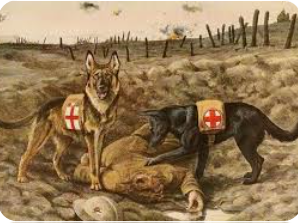
10 Elsie The letter N
No man’s Land – During the First World War No Man’s Land was the empty strip of territory that divided two opposing forces. The enemies were separated by barbed wire and miles of empty land. It was a place where cruel and deadly battles were fought. It was a place where the worst side of humanity was expressed and where evil and misery took hold. At the outbreak of World War 1, the term ‘No Man’s land’ was used commonly but it was first used in medieval times for territory that was disputed. Retrieving the dead or wounded from No Man’s Land was an extremely dangerous task. The first World War is often referred to as the static war – the presence of barbed wire fence meant no advancement and each side preferred to attack the enemy from a distance. Fear of going into No Man’s land was continuously referred to and described by soldiers. Most activity on No Man’s land took place during the night. It was characterised by destroyed vegetation, mud-soaked craters and rotting corpses. The First World War was the first of its kind. Soldiers were no longer fighting on horseback with rifles but they became zombie-like characters fighting with portable machine guns, explosives, tanks and flamethrowers, air raids and gas. In the trenches, soldiers lived in subhuman conditions and suffered enormously. The phrase ‘Going over the top” referred to the act of soldiers being ordered to leaving their trenches and charge across no man’s land towards enemy lines. Many of them were mown down by machine gun fire from the enemy. Some soldiers were accused of being cowardly and were shot by their own army when they refused the command to go into No Man’s Land. People now understand that many of these soldiers were suffering from PTSD a mental health condition caused by an extremely stressful or terrifying event.
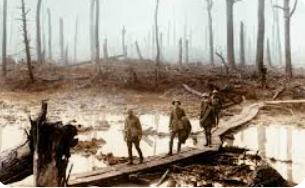
11 Oliver The letter C
Children – children were expected to help and do their bit with the war effort such as by growing vegetables and delivering milk. They collected blankets, books and even conkers. Chemicals from conkers were used in making shells and bullets. Boy Scouts and Girl Guides were given important jobs. Boy scouts collected eggs for injured troops, and they guarded railway lines, water reservoirs and coastline. They watched the skies for attacks and sounded bugles when an air raid was over. Rifle ranges were opened where boys could learn how to shoot so that they could defend Britain if it was invaded. Girl guides knitted socks and scarves to keep the British soldiers warm. They learned first aid so that they could help with injuries and carried important messages. Some reports even suggest that Girl Guides acted as messengers for the British Secret Service MI5. Often children were needed to look after younger brothers and sisters because mothers were working in factories. Some boys lied about their age and went off to fight in the war. The youngest known soldier was Sidney Lewis who was 12 years old when he signed up. He fought a year later in the Battle of the Somme which was one of the bloodiest battles. It is known that 250,000 boys were enlisted that were under the legal age limit. Recruitment officers were paid 2 shillings and sixpence for each recruit so they would often ignore any concerns they had about age.
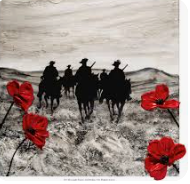
12 Joss The final Letter E
End – The End of World War 1 – many people agree that the First World War changed the world. It led to restructuring the political order in Europe and other parts of the world. It was the start of the end of the British Empire, too. The war started Britain’s decline as the world’s biggest economic power. The economies of many countries in Europe were in trouble with necessities like food and fuel much higher than they had been at the start of the war. The war had cost over £3 billion, and Britain’s trade and industry was ruined. Returning soldiers were given their old jobs back and the closure of munitions factories meant that women workers were no longer needed. Britain incurred 715 000 military deaths and more than double that number were wounded. Of those who did come home from war, many were injured physically or struggled mentally because of what they had experienced. Leaders had significantly miscalculated thinking that competition would end in victory for some but what enfolded led to ruin for all those involved. The First World War became known as the war to end all wars as no conflict before World War 1 had caused destruction on this scale. People wanted to believe that nobody would ever want to go to war again after it. Sadly, we know that this was not to be the last devastating war that the world would experience.


